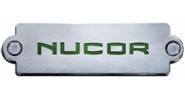Market Segment

July 23, 2015
Ferriola Feeling Good About Trade Legislation
Written by Sandy Williams
Nucor Corporation announced net earnings of $124.8 million for second quarter. Sales of $4.36 billion were down 1 percent from Q1 and 18 percent from Q2 2014. Total tons shipped increased by 5 percent from first quarter to 6,055,000 tons but were down 13 percent year over year. Imports pressured average sales price per ton, decreasing 8 percent from the first quarter of 2015 and 13 percent from the second quarter of 2014.
Commenting on second quarter results, President and CEO John Ferriola said, “The performance of the steel mills segment in the second quarter of 2015 decreased from the first quarter of 2015. Pricing has begun to stabilize, but we experienced some margin erosion as the steel mills worked through higher cost scrap, work-in-process and finished goods inventories. Pricing remains under pressure from exceptionally high levels of imports. Imports accounted for an estimated 32% of the finished steel market in the first six months of 2015, compared with an estimated 27% in the first six months of 2014. The biggest factors driving these exceptionally high levels of imports are the trade-distorting practices of some foreign governments.
“We are pleased with recently passed legislation that strengthens our trade laws and provides the steel industry with more effective tools to fight back against unfair trade. While these trade law changes alone will not address the serious challenges facing the U.S. steel industry due to systemic steel overcapacity overseas, they do strengthen our hand against illegal trade practices.”
Nucor Steel Louisiana had an operating loss of $20 million for Q2 which included $10 million in repair costs to the process gas heater. The facility is working through higher priced iron ore inventory and is expected to break even or show profit by the end of the year. Louisiana produced 540,000 tons of DRI in second quarter. Current utilization at Louisiana is around 90 percent.
The flexibility of Nucor’s raw material strategy is a positive for the company going forward said Ferriola. “It gives us the ability to switch back and forth which area we want to press, whether it’s in scrap or whether it’s in DRI, depending on what the cost of the iron unit is. At the end of the day, an iron unit is an iron unit. What it does is it gives us the flexibility to change and modify our feedstock mix so that we can optimize our mix based upon current pricing in the different commodities.”
Earnings results for third quarter are expected to benefit from lower cost inventories and improved performance of the steel mills segment. Nucor is optimistic about nonresidential construction and reports seeing “positive things” such as stronger backlog and pricing that will help downstream products in third quarter. Raw materials performance is expected to be comparable to second quarter.
Ferriola commented on the challenging steel environment and said the company capitalizes on its “unrivaled position of strength.” “We do not welcome tough times,” said Ferriola, “but we do not fear them.”
Imports were the biggest topic of discussion during the earnings conference call. Ferriola was very optimistic about the benefits of the new trade legislation and feels “better about what was happening in the Washington than I’ve had in the past 20 years of my steel career and I feel even better today than I did two calls ago.”
“We are very optimistic about potential upside. We’re very positive about the language in the legislation. Clearly it gives us much stronger tools to fight back against on fair trade. Just to mention maybe a couple of the things that it does for us, number one is it – it changes the definition of injury, it gives the International Trade Commission, a much broader list of factors, when determining whether an industry has been injured, not just profitability, that’s important. It’s no – will no longer be necessary for us to suffer severe financial damage before action can be taken.
“Another provision enhances the congress department’s discretion in dealing with foreign companies and foreign governments that are uncooperative or very slow to provide the information they need to make a determination. So although I have to say that this is a very positive first step, there is more work to be done. And we believe that this will create a much more balanced and fair marketplace competition here in the United States, but there is still work to be done. So we will continue to work in Washington with elected officials and continue to press for even stronger trade loss in the future.”
When asked if there are any signs of global overcapacity being addressed, Ferriola said he believes China is beginning to understand that they have too much capacity.
“We’re hearing a little bit about some potential capacity cutbacks beings driven by economics and also being driven by environmental concerns that are very real. So long-term, I do think that you’re going to see some capacity reduction in China.
“Here in the States it’s impossible for me to say what’s going to happen in the way of closures going forward. But in a world of overcapacity there will be those players who cannot survive. The key here is to remember that Nucor has always been a low cost producer of steel and steel products and that is where we shine. So at the end of the day, if there is potential closures here in the United States or somewhere else around the world, this one thing I can assure you. One of the names of the places closing will not be Nucor; we will still be in business…. We won’t be one of the ones who will be closing.”







